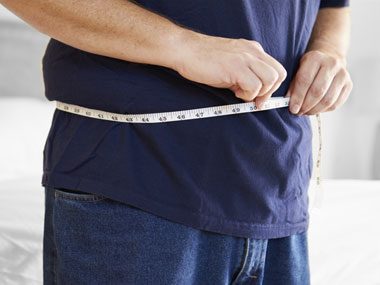
If they’re an optimist
A glass-half-full partner is a good influence, reports a new University of Michigan study. When researchers followed nearly 2,000 couples (over age 50) for four years, they found that when one spouse was an optimist, the other had better mobility and fewer chronic illnesses, regardless of their own levels of optimism. A positive-thinking partner may be more likely to encourage their spouse to eat well or exercise because they genuinely believe these habits can make a difference, according to researchers.

If they’re trying to lose weight (and you are too)
Oddly, it could derail your efforts. A recent study of 50 couples (who made joint weight-loss goals) found that watching your spouse lose weight can hinder your slim down. “When people close to us are performing better than we are, we can feel threatened and give up,” study author Jennifer Jill Harman, PhD, Colorado State University associate professor, told Shape magazine. She advises that couples support each others’ efforts, but set separate goals.

If they have a good exercise regimen
It could be the kick in the pants you need. When a wife met U.S. government exercise recommendations (working out 150 minutes a week at moderate intensity), her husband was 70 percent more likely to meet those guidelines at a subsequent checkup than those whose wives were less active, a recent study from Israeli and Johns Hopkins researchers recently found. When a husband met the recommended levels, his wife was 40 percent more likely to work out that often.

If they work long hours
This one’s tricky. Women whose husbands worked more than 40 hours a week were in better health compared to women whose husbands worked typical 9-to-5 hours, according to a University of Texas study that analyzed the work and health records of nearly 3,800 men and women. That’s likely due to the benefits of additional income. But men whose wives worked more than 40 hours a week were actually in worse health than those whose wives worked fewer hours. Researchers theorize that “while a wife’s longer schedule doesn’t necessarily translate into appreciably more money, it may leave their husband with more homebound responsibility and less time to work out,” according to HealthDay.

If they tend to lend a hand
Your heart might benefit. People who reported feeling that their partner is always helpful had lower levels of calcium buildup in their arteries (a predictor of heart disease) than those who said their partners were sometimes helpful, sometimes not, according to University of Utah research published last year. Pairs had the highest calcium levels (and therefore the greatest heart risks) when both members felt their spouse was unsupportive, slightly lower calcium levels when only one spouse felt that way, and the lowest calcium levels when neither spouse felt the other was unsupportive. Researchers think that a perceived lack of support could increase stress and in turn harm cardiovascular health.

If they make you feel content
You may pack on a few pounds (especially in the honeymoon phase of marriage). A team of researchers followed 169 newlywed couples for the first four years of their marriage. Those who reported feeling happy in their relationship were more likely to gain weight than those who felt less satisfied. A few factors may be at play, say researchers. Couples who no longer feel like they need to “hunt for a mate” may not worry as much about maintaining their weight. Couples also tend to compare themselves to their partner; if one person gains weight, the other one might not notice as much or feel as bad if they do too.

If they have diabetes
Your risk of developing this metabolic disorder is 26 percent higher, according to McGill University research that analyzed health data on more than 75,000 couples. Researchers say shared poor eating and exercise habits might be to blame. While asking a patient about their family history is common, physicians should consider asking about a spouse’s health status too, researchers say.

If they have chronic pain at night
Your sleep may suffer. One study found that partners of arthritis patients reported sleeping more poorly on nights their bedmates were in more pain.